Analysis of Contract and Negligence in Business Law: Report
VerifiedAdded on 2019/12/18
|8
|2200
|233
Report
AI Summary
This report provides a comprehensive analysis of contract law and negligence within a business context. It begins by outlining the essential elements of a valid contract, including offer and acceptance, mutual consent, intention to create legal obligations, consideration, capacity, and agreement. The report then classifies different types of contracts, such as unilateral, bilateral, express, and implied, and analyzes the impact of various contract terms like implied terms, express terms, conditions, warranties, and exclusion clauses. The core of the report applies these concepts to several business scenarios, evaluating the application of contract elements, liability in torts versus contractual liability, and the principles of negligence and vicarious liability. The report examines scenarios involving invitations to offer, unilateral contracts, exclusion clauses, and the duties of care. It concludes by summarizing key findings and emphasizing the importance of civil law, contract law, and tort law for society, along with the principles of vicarious liability and the essential components of negligence.

Aspects of Contract
and negligence for
business
and negligence for
business
Paraphrase This Document
Need a fresh take? Get an instant paraphrase of this document with our AI Paraphraser

Table of Contents
Introduction ..............................................................................................................1
Task 1 ........................................................................................................................1
Task 2 ........................................................................................................................2
Task 3 ........................................................................................................................3
Task 4 ........................................................................................................................4
Conclusion .................................................................................................................5
References ..................................................................................................................6
Introduction ..............................................................................................................1
Task 1 ........................................................................................................................1
Task 2 ........................................................................................................................2
Task 3 ........................................................................................................................3
Task 4 ........................................................................................................................4
Conclusion .................................................................................................................5
References ..................................................................................................................6
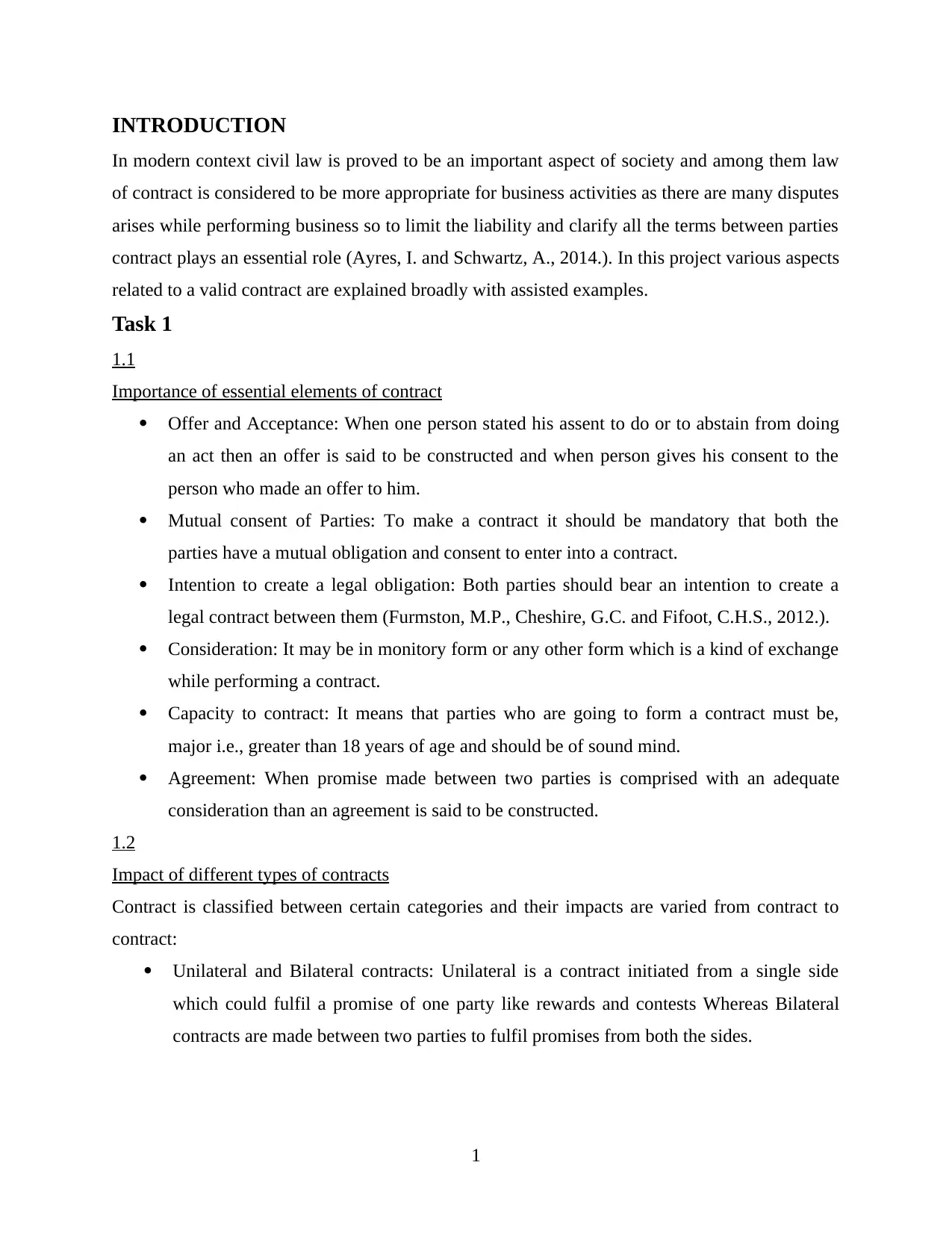
INTRODUCTION
In modern context civil law is proved to be an important aspect of society and among them law
of contract is considered to be more appropriate for business activities as there are many disputes
arises while performing business so to limit the liability and clarify all the terms between parties
contract plays an essential role (Ayres, I. and Schwartz, A., 2014.). In this project various aspects
related to a valid contract are explained broadly with assisted examples.
Task 1
1.1
Importance of essential elements of contract
Offer and Acceptance: When one person stated his assent to do or to abstain from doing
an act then an offer is said to be constructed and when person gives his consent to the
person who made an offer to him.
Mutual consent of Parties: To make a contract it should be mandatory that both the
parties have a mutual obligation and consent to enter into a contract.
Intention to create a legal obligation: Both parties should bear an intention to create a
legal contract between them (Furmston, M.P., Cheshire, G.C. and Fifoot, C.H.S., 2012.).
Consideration: It may be in monitory form or any other form which is a kind of exchange
while performing a contract.
Capacity to contract: It means that parties who are going to form a contract must be,
major i.e., greater than 18 years of age and should be of sound mind.
Agreement: When promise made between two parties is comprised with an adequate
consideration than an agreement is said to be constructed.
1.2
Impact of different types of contracts
Contract is classified between certain categories and their impacts are varied from contract to
contract:
Unilateral and Bilateral contracts: Unilateral is a contract initiated from a single side
which could fulfil a promise of one party like rewards and contests Whereas Bilateral
contracts are made between two parties to fulfil promises from both the sides.
1
In modern context civil law is proved to be an important aspect of society and among them law
of contract is considered to be more appropriate for business activities as there are many disputes
arises while performing business so to limit the liability and clarify all the terms between parties
contract plays an essential role (Ayres, I. and Schwartz, A., 2014.). In this project various aspects
related to a valid contract are explained broadly with assisted examples.
Task 1
1.1
Importance of essential elements of contract
Offer and Acceptance: When one person stated his assent to do or to abstain from doing
an act then an offer is said to be constructed and when person gives his consent to the
person who made an offer to him.
Mutual consent of Parties: To make a contract it should be mandatory that both the
parties have a mutual obligation and consent to enter into a contract.
Intention to create a legal obligation: Both parties should bear an intention to create a
legal contract between them (Furmston, M.P., Cheshire, G.C. and Fifoot, C.H.S., 2012.).
Consideration: It may be in monitory form or any other form which is a kind of exchange
while performing a contract.
Capacity to contract: It means that parties who are going to form a contract must be,
major i.e., greater than 18 years of age and should be of sound mind.
Agreement: When promise made between two parties is comprised with an adequate
consideration than an agreement is said to be constructed.
1.2
Impact of different types of contracts
Contract is classified between certain categories and their impacts are varied from contract to
contract:
Unilateral and Bilateral contracts: Unilateral is a contract initiated from a single side
which could fulfil a promise of one party like rewards and contests Whereas Bilateral
contracts are made between two parties to fulfil promises from both the sides.
1
⊘ This is a preview!⊘
Do you want full access?
Subscribe today to unlock all pages.

Trusted by 1+ million students worldwide
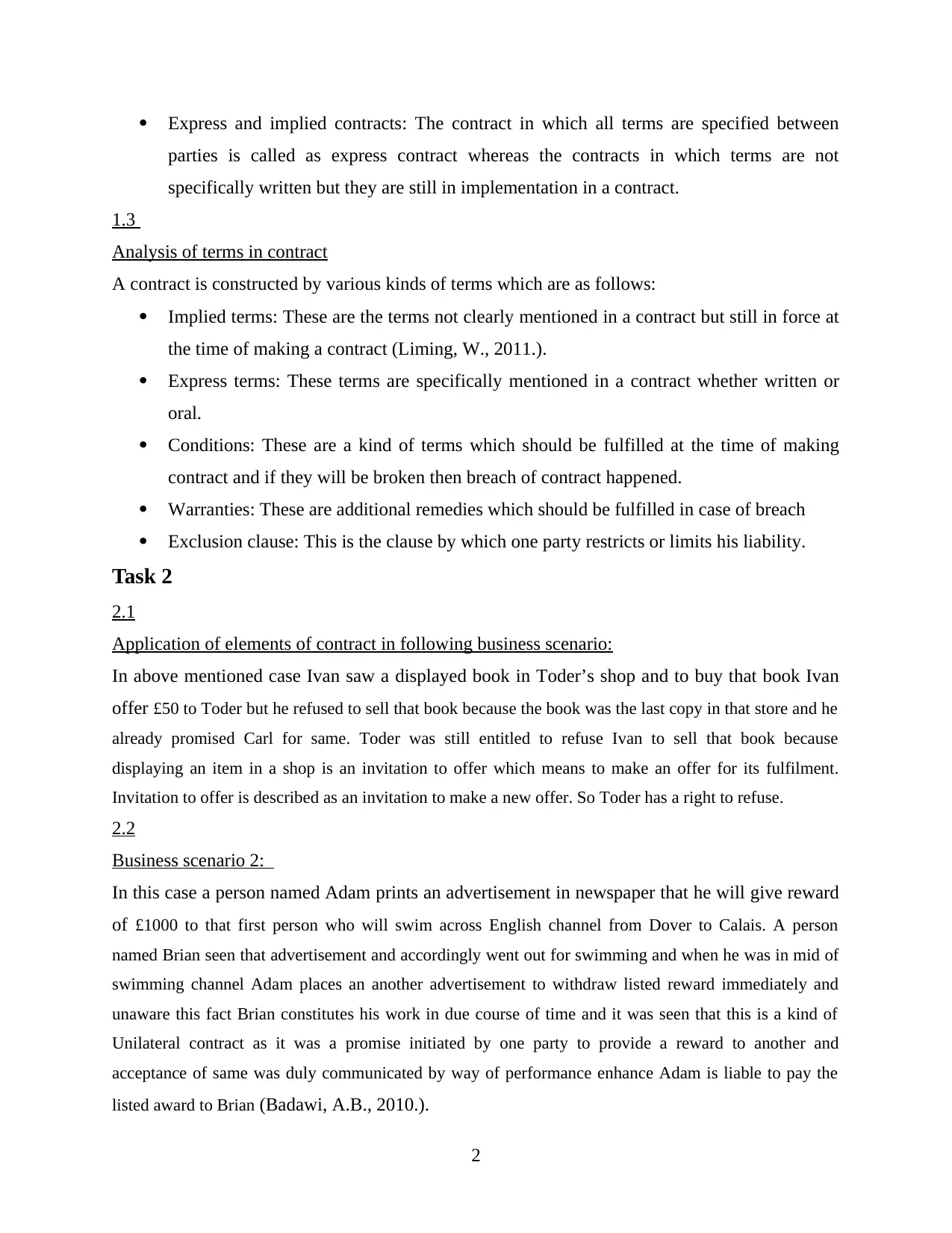
Express and implied contracts: The contract in which all terms are specified between
parties is called as express contract whereas the contracts in which terms are not
specifically written but they are still in implementation in a contract.
1.3
Analysis of terms in contract
A contract is constructed by various kinds of terms which are as follows:
Implied terms: These are the terms not clearly mentioned in a contract but still in force at
the time of making a contract (Liming, W., 2011.).
Express terms: These terms are specifically mentioned in a contract whether written or
oral.
Conditions: These are a kind of terms which should be fulfilled at the time of making
contract and if they will be broken then breach of contract happened.
Warranties: These are additional remedies which should be fulfilled in case of breach
Exclusion clause: This is the clause by which one party restricts or limits his liability.
Task 2
2.1
Application of elements of contract in following business scenario:
In above mentioned case Ivan saw a displayed book in Toder’s shop and to buy that book Ivan
offer £50 to Toder but he refused to sell that book because the book was the last copy in that store and he
already promised Carl for same. Toder was still entitled to refuse Ivan to sell that book because
displaying an item in a shop is an invitation to offer which means to make an offer for its fulfilment.
Invitation to offer is described as an invitation to make a new offer. So Toder has a right to refuse.
2.2
Business scenario 2:
In this case a person named Adam prints an advertisement in newspaper that he will give reward
of £1000 to that first person who will swim across English channel from Dover to Calais. A person
named Brian seen that advertisement and accordingly went out for swimming and when he was in mid of
swimming channel Adam places an another advertisement to withdraw listed reward immediately and
unaware this fact Brian constitutes his work in due course of time and it was seen that this is a kind of
Unilateral contract as it was a promise initiated by one party to provide a reward to another and
acceptance of same was duly communicated by way of performance enhance Adam is liable to pay the
listed award to Brian (Badawi, A.B., 2010.).
2
parties is called as express contract whereas the contracts in which terms are not
specifically written but they are still in implementation in a contract.
1.3
Analysis of terms in contract
A contract is constructed by various kinds of terms which are as follows:
Implied terms: These are the terms not clearly mentioned in a contract but still in force at
the time of making a contract (Liming, W., 2011.).
Express terms: These terms are specifically mentioned in a contract whether written or
oral.
Conditions: These are a kind of terms which should be fulfilled at the time of making
contract and if they will be broken then breach of contract happened.
Warranties: These are additional remedies which should be fulfilled in case of breach
Exclusion clause: This is the clause by which one party restricts or limits his liability.
Task 2
2.1
Application of elements of contract in following business scenario:
In above mentioned case Ivan saw a displayed book in Toder’s shop and to buy that book Ivan
offer £50 to Toder but he refused to sell that book because the book was the last copy in that store and he
already promised Carl for same. Toder was still entitled to refuse Ivan to sell that book because
displaying an item in a shop is an invitation to offer which means to make an offer for its fulfilment.
Invitation to offer is described as an invitation to make a new offer. So Toder has a right to refuse.
2.2
Business scenario 2:
In this case a person named Adam prints an advertisement in newspaper that he will give reward
of £1000 to that first person who will swim across English channel from Dover to Calais. A person
named Brian seen that advertisement and accordingly went out for swimming and when he was in mid of
swimming channel Adam places an another advertisement to withdraw listed reward immediately and
unaware this fact Brian constitutes his work in due course of time and it was seen that this is a kind of
Unilateral contract as it was a promise initiated by one party to provide a reward to another and
acceptance of same was duly communicated by way of performance enhance Adam is liable to pay the
listed award to Brian (Badawi, A.B., 2010.).
2
Paraphrase This Document
Need a fresh take? Get an instant paraphrase of this document with our AI Paraphraser
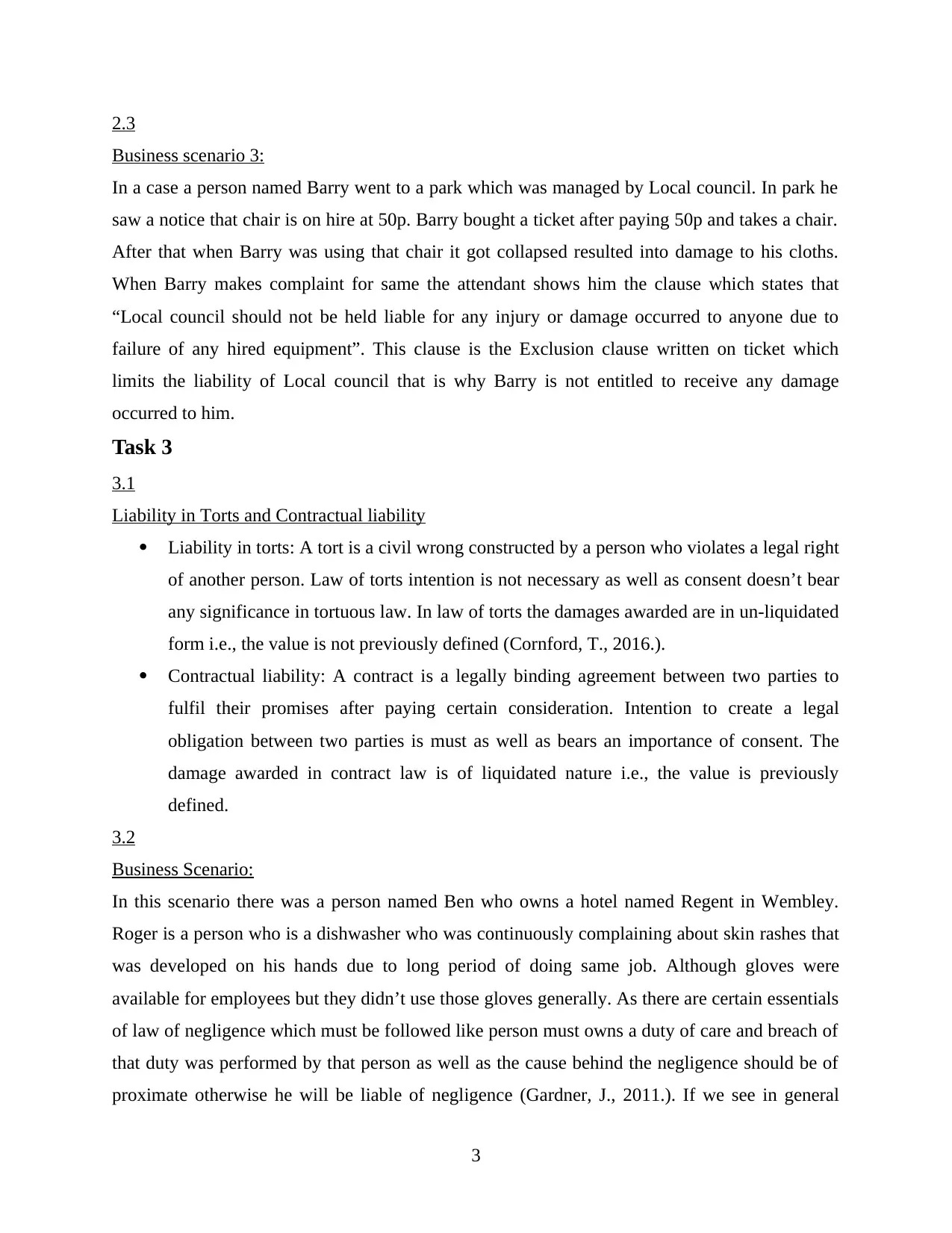
2.3
Business scenario 3:
In a case a person named Barry went to a park which was managed by Local council. In park he
saw a notice that chair is on hire at 50p. Barry bought a ticket after paying 50p and takes a chair.
After that when Barry was using that chair it got collapsed resulted into damage to his cloths.
When Barry makes complaint for same the attendant shows him the clause which states that
“Local council should not be held liable for any injury or damage occurred to anyone due to
failure of any hired equipment”. This clause is the Exclusion clause written on ticket which
limits the liability of Local council that is why Barry is not entitled to receive any damage
occurred to him.
Task 3
3.1
Liability in Torts and Contractual liability
Liability in torts: A tort is a civil wrong constructed by a person who violates a legal right
of another person. Law of torts intention is not necessary as well as consent doesn’t bear
any significance in tortuous law. In law of torts the damages awarded are in un-liquidated
form i.e., the value is not previously defined (Cornford, T., 2016.).
Contractual liability: A contract is a legally binding agreement between two parties to
fulfil their promises after paying certain consideration. Intention to create a legal
obligation between two parties is must as well as bears an importance of consent. The
damage awarded in contract law is of liquidated nature i.e., the value is previously
defined.
3.2
Business Scenario:
In this scenario there was a person named Ben who owns a hotel named Regent in Wembley.
Roger is a person who is a dishwasher who was continuously complaining about skin rashes that
was developed on his hands due to long period of doing same job. Although gloves were
available for employees but they didn’t use those gloves generally. As there are certain essentials
of law of negligence which must be followed like person must owns a duty of care and breach of
that duty was performed by that person as well as the cause behind the negligence should be of
proximate otherwise he will be liable of negligence (Gardner, J., 2011.). If we see in general
3
Business scenario 3:
In a case a person named Barry went to a park which was managed by Local council. In park he
saw a notice that chair is on hire at 50p. Barry bought a ticket after paying 50p and takes a chair.
After that when Barry was using that chair it got collapsed resulted into damage to his cloths.
When Barry makes complaint for same the attendant shows him the clause which states that
“Local council should not be held liable for any injury or damage occurred to anyone due to
failure of any hired equipment”. This clause is the Exclusion clause written on ticket which
limits the liability of Local council that is why Barry is not entitled to receive any damage
occurred to him.
Task 3
3.1
Liability in Torts and Contractual liability
Liability in torts: A tort is a civil wrong constructed by a person who violates a legal right
of another person. Law of torts intention is not necessary as well as consent doesn’t bear
any significance in tortuous law. In law of torts the damages awarded are in un-liquidated
form i.e., the value is not previously defined (Cornford, T., 2016.).
Contractual liability: A contract is a legally binding agreement between two parties to
fulfil their promises after paying certain consideration. Intention to create a legal
obligation between two parties is must as well as bears an importance of consent. The
damage awarded in contract law is of liquidated nature i.e., the value is previously
defined.
3.2
Business Scenario:
In this scenario there was a person named Ben who owns a hotel named Regent in Wembley.
Roger is a person who is a dishwasher who was continuously complaining about skin rashes that
was developed on his hands due to long period of doing same job. Although gloves were
available for employees but they didn’t use those gloves generally. As there are certain essentials
of law of negligence which must be followed like person must owns a duty of care and breach of
that duty was performed by that person as well as the cause behind the negligence should be of
proximate otherwise he will be liable of negligence (Gardner, J., 2011.). If we see in general
3
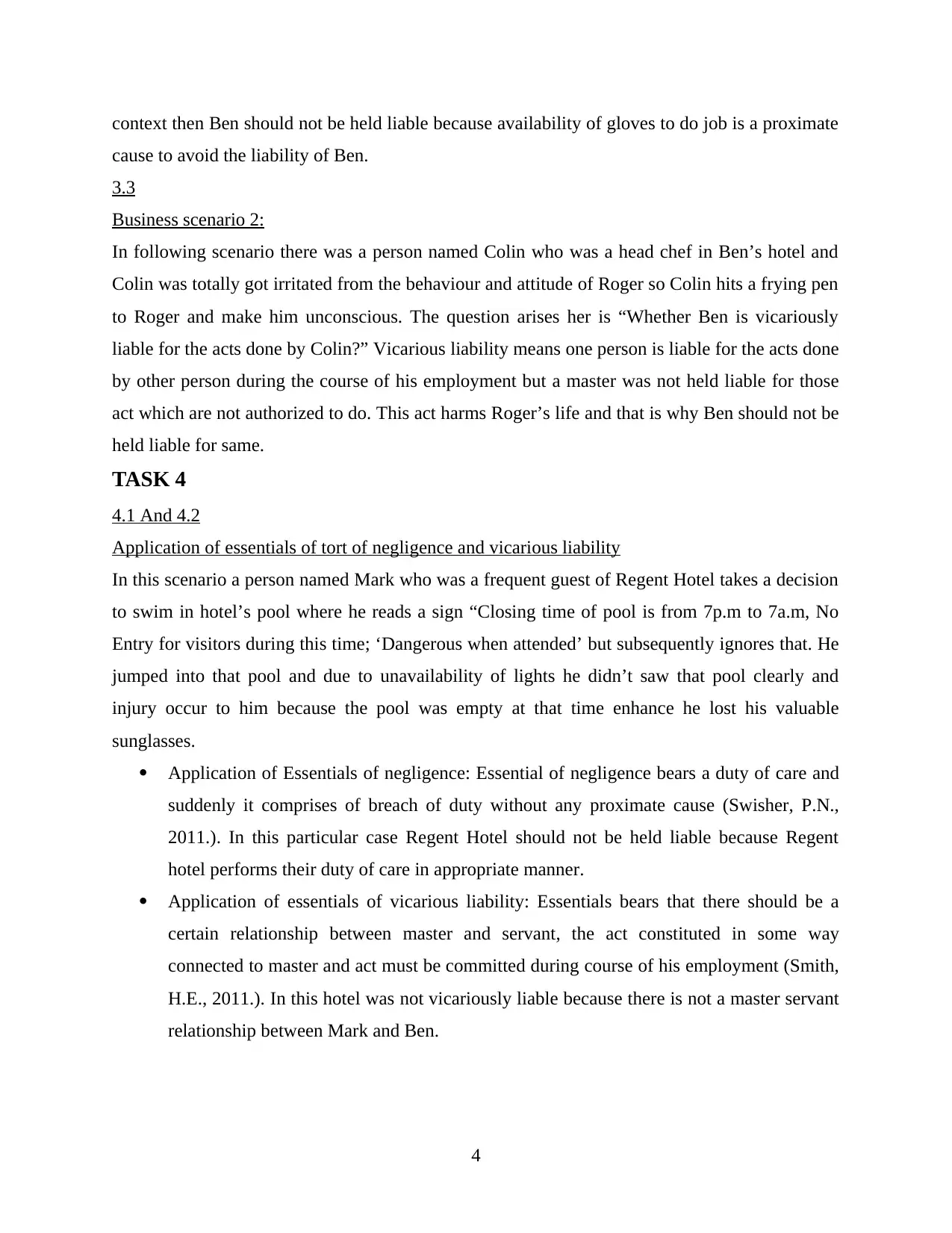
context then Ben should not be held liable because availability of gloves to do job is a proximate
cause to avoid the liability of Ben.
3.3
Business scenario 2:
In following scenario there was a person named Colin who was a head chef in Ben’s hotel and
Colin was totally got irritated from the behaviour and attitude of Roger so Colin hits a frying pen
to Roger and make him unconscious. The question arises her is “Whether Ben is vicariously
liable for the acts done by Colin?” Vicarious liability means one person is liable for the acts done
by other person during the course of his employment but a master was not held liable for those
act which are not authorized to do. This act harms Roger’s life and that is why Ben should not be
held liable for same.
TASK 4
4.1 And 4.2
Application of essentials of tort of negligence and vicarious liability
In this scenario a person named Mark who was a frequent guest of Regent Hotel takes a decision
to swim in hotel’s pool where he reads a sign “Closing time of pool is from 7p.m to 7a.m, No
Entry for visitors during this time; ‘Dangerous when attended’ but subsequently ignores that. He
jumped into that pool and due to unavailability of lights he didn’t saw that pool clearly and
injury occur to him because the pool was empty at that time enhance he lost his valuable
sunglasses.
Application of Essentials of negligence: Essential of negligence bears a duty of care and
suddenly it comprises of breach of duty without any proximate cause (Swisher, P.N.,
2011.). In this particular case Regent Hotel should not be held liable because Regent
hotel performs their duty of care in appropriate manner.
Application of essentials of vicarious liability: Essentials bears that there should be a
certain relationship between master and servant, the act constituted in some way
connected to master and act must be committed during course of his employment (Smith,
H.E., 2011.). In this hotel was not vicariously liable because there is not a master servant
relationship between Mark and Ben.
4
cause to avoid the liability of Ben.
3.3
Business scenario 2:
In following scenario there was a person named Colin who was a head chef in Ben’s hotel and
Colin was totally got irritated from the behaviour and attitude of Roger so Colin hits a frying pen
to Roger and make him unconscious. The question arises her is “Whether Ben is vicariously
liable for the acts done by Colin?” Vicarious liability means one person is liable for the acts done
by other person during the course of his employment but a master was not held liable for those
act which are not authorized to do. This act harms Roger’s life and that is why Ben should not be
held liable for same.
TASK 4
4.1 And 4.2
Application of essentials of tort of negligence and vicarious liability
In this scenario a person named Mark who was a frequent guest of Regent Hotel takes a decision
to swim in hotel’s pool where he reads a sign “Closing time of pool is from 7p.m to 7a.m, No
Entry for visitors during this time; ‘Dangerous when attended’ but subsequently ignores that. He
jumped into that pool and due to unavailability of lights he didn’t saw that pool clearly and
injury occur to him because the pool was empty at that time enhance he lost his valuable
sunglasses.
Application of Essentials of negligence: Essential of negligence bears a duty of care and
suddenly it comprises of breach of duty without any proximate cause (Swisher, P.N.,
2011.). In this particular case Regent Hotel should not be held liable because Regent
hotel performs their duty of care in appropriate manner.
Application of essentials of vicarious liability: Essentials bears that there should be a
certain relationship between master and servant, the act constituted in some way
connected to master and act must be committed during course of his employment (Smith,
H.E., 2011.). In this hotel was not vicariously liable because there is not a master servant
relationship between Mark and Ben.
4
⊘ This is a preview!⊘
Do you want full access?
Subscribe today to unlock all pages.

Trusted by 1+ million students worldwide

CONCLUSION
It has been concluded from the above mentioned report that civil law whether it is contract law
or tort law is very important for society. Aspects of different types of contracts are broadly
explained in this report as well as principles of vicarious liability were also laid down with
assisted case laws. It was further concluded that tort of negligence is conducted by breach of
duty of care.
5
It has been concluded from the above mentioned report that civil law whether it is contract law
or tort law is very important for society. Aspects of different types of contracts are broadly
explained in this report as well as principles of vicarious liability were also laid down with
assisted case laws. It was further concluded that tort of negligence is conducted by breach of
duty of care.
5
Paraphrase This Document
Need a fresh take? Get an instant paraphrase of this document with our AI Paraphraser
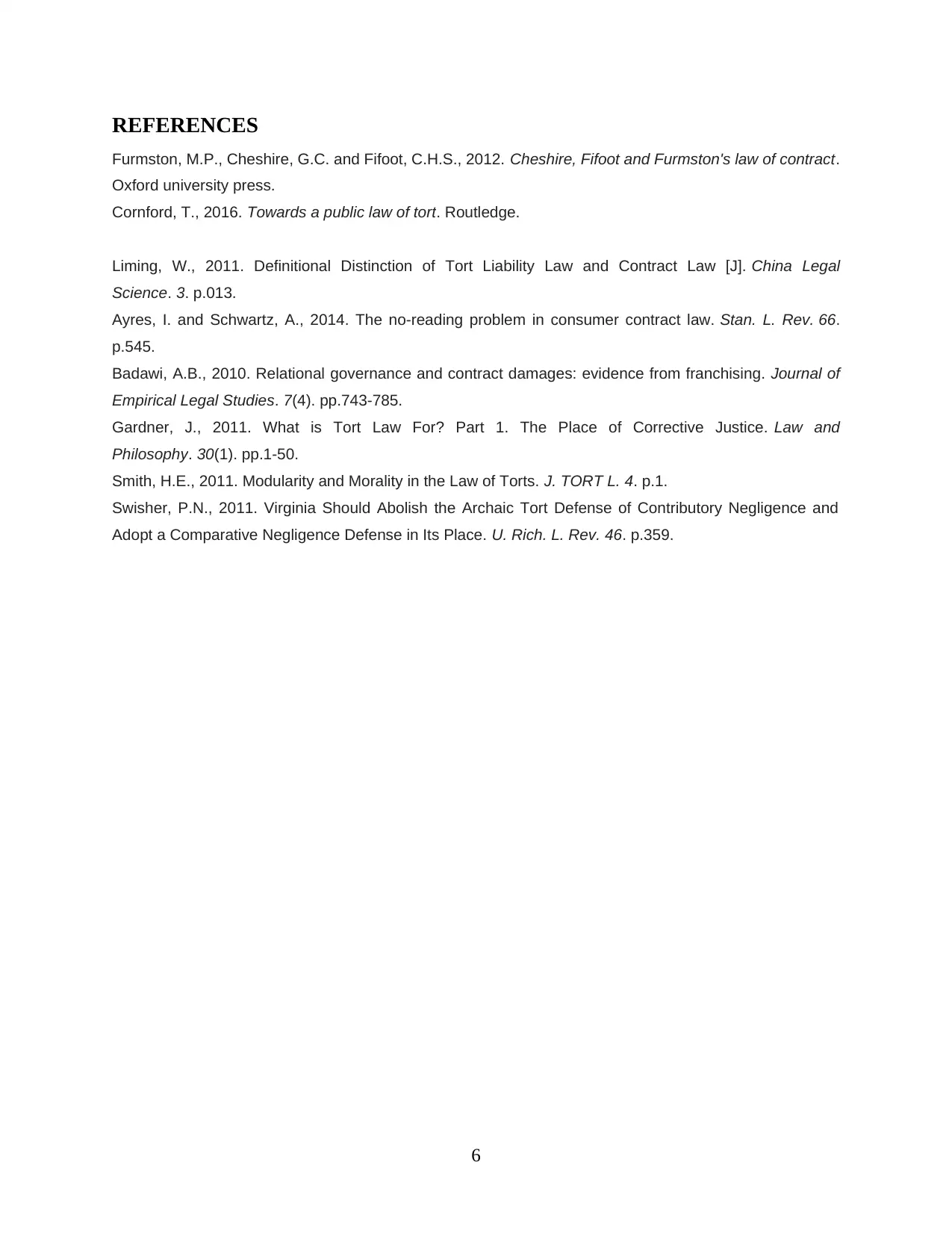
REFERENCES
Furmston, M.P., Cheshire, G.C. and Fifoot, C.H.S., 2012. Cheshire, Fifoot and Furmston's law of contract.
Oxford university press.
Cornford, T., 2016. Towards a public law of tort. Routledge.
Liming, W., 2011. Definitional Distinction of Tort Liability Law and Contract Law [J]. China Legal
Science. 3. p.013.
Ayres, I. and Schwartz, A., 2014. The no-reading problem in consumer contract law. Stan. L. Rev. 66.
p.545.
Badawi, A.B., 2010. Relational governance and contract damages: evidence from franchising. Journal of
Empirical Legal Studies. 7(4). pp.743-785.
Gardner, J., 2011. What is Tort Law For? Part 1. The Place of Corrective Justice. Law and
Philosophy. 30(1). pp.1-50.
Smith, H.E., 2011. Modularity and Morality in the Law of Torts. J. TORT L. 4. p.1.
Swisher, P.N., 2011. Virginia Should Abolish the Archaic Tort Defense of Contributory Negligence and
Adopt a Comparative Negligence Defense in Its Place. U. Rich. L. Rev. 46. p.359.
6
Furmston, M.P., Cheshire, G.C. and Fifoot, C.H.S., 2012. Cheshire, Fifoot and Furmston's law of contract.
Oxford university press.
Cornford, T., 2016. Towards a public law of tort. Routledge.
Liming, W., 2011. Definitional Distinction of Tort Liability Law and Contract Law [J]. China Legal
Science. 3. p.013.
Ayres, I. and Schwartz, A., 2014. The no-reading problem in consumer contract law. Stan. L. Rev. 66.
p.545.
Badawi, A.B., 2010. Relational governance and contract damages: evidence from franchising. Journal of
Empirical Legal Studies. 7(4). pp.743-785.
Gardner, J., 2011. What is Tort Law For? Part 1. The Place of Corrective Justice. Law and
Philosophy. 30(1). pp.1-50.
Smith, H.E., 2011. Modularity and Morality in the Law of Torts. J. TORT L. 4. p.1.
Swisher, P.N., 2011. Virginia Should Abolish the Archaic Tort Defense of Contributory Negligence and
Adopt a Comparative Negligence Defense in Its Place. U. Rich. L. Rev. 46. p.359.
6
1 out of 8
Related Documents
Your All-in-One AI-Powered Toolkit for Academic Success.
+13062052269
info@desklib.com
Available 24*7 on WhatsApp / Email
![[object Object]](/_next/static/media/star-bottom.7253800d.svg)
Unlock your academic potential
Copyright © 2020–2026 A2Z Services. All Rights Reserved. Developed and managed by ZUCOL.




